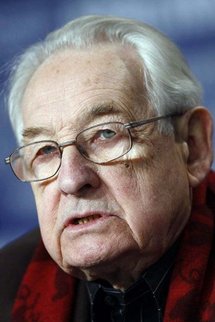
Andrzej Wajda
Only in 1990, a year before the USSR's final collapse, did then-Kremlin leader Mikhail Gorbachev admit his country's responsibility.
But Russian justice authorities' refusal in recent years to re-open an inquiry into the massacre has angered Poles.
A live television debate on Russia's Kultura channel was planned after the film's showing Friday.
Russian government mouthpiece Rossiiskaya Gazeta -- which has previously run commentaries raising doubts over the Soviets' role at Katyn -- hailed the television screening as a step toward "restoring historic truths."
In a flattering review titled "Atonement", it said the very fact the film's screening had become possible in Russia "shows our society's serious progress on the path toward restoring historic truth about the tragedy of World War II."
"For Poles this is an act of awakening consciousness. For Russians, 'Katyn' could be one of penitence," the paper said.
Wajda's powerful film shows how Soviet propaganda blamed the Katyn deaths on Hitler and punished anyone who even hinted at Russian involvement.
Nevertheless, the acclaimed director has pleaded against overly political interpretations of his masterpiece.
"This is an elegy, a film of mourning ... not a political film," Wajda said when his film was screened out of competition at the Berlin Film Festival.
"It is too tragic to be manipulated from a political standpoint."
The World War II murder of 22,500 Polish officers -- among them Wajda's own father -- by Stalin's NKVD secret police in western Russia and other cities remains a sensitive issue.
However, Prime Minister Vladimir Putin in February extended the first official invitation to Polish Prime Minister Donald Tusk to commemorate the deaths at Katyn.
The move was seen as a watershed. While a string of Polish leaders have been to Katyn since the fall of the communist bloc in 1989, all previous visits have been unofficial.
-------------------------------------------------------------------
But Russian justice authorities' refusal in recent years to re-open an inquiry into the massacre has angered Poles.
A live television debate on Russia's Kultura channel was planned after the film's showing Friday.
Russian government mouthpiece Rossiiskaya Gazeta -- which has previously run commentaries raising doubts over the Soviets' role at Katyn -- hailed the television screening as a step toward "restoring historic truths."
In a flattering review titled "Atonement", it said the very fact the film's screening had become possible in Russia "shows our society's serious progress on the path toward restoring historic truth about the tragedy of World War II."
"For Poles this is an act of awakening consciousness. For Russians, 'Katyn' could be one of penitence," the paper said.
Wajda's powerful film shows how Soviet propaganda blamed the Katyn deaths on Hitler and punished anyone who even hinted at Russian involvement.
Nevertheless, the acclaimed director has pleaded against overly political interpretations of his masterpiece.
"This is an elegy, a film of mourning ... not a political film," Wajda said when his film was screened out of competition at the Berlin Film Festival.
"It is too tragic to be manipulated from a political standpoint."
The World War II murder of 22,500 Polish officers -- among them Wajda's own father -- by Stalin's NKVD secret police in western Russia and other cities remains a sensitive issue.
However, Prime Minister Vladimir Putin in February extended the first official invitation to Polish Prime Minister Donald Tusk to commemorate the deaths at Katyn.
The move was seen as a watershed. While a string of Polish leaders have been to Katyn since the fall of the communist bloc in 1989, all previous visits have been unofficial.
-------------------------------------------------------------------









 Home
Home Politics
Politics









